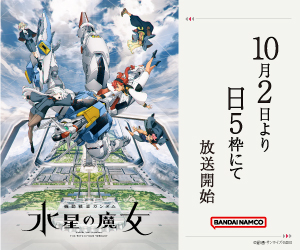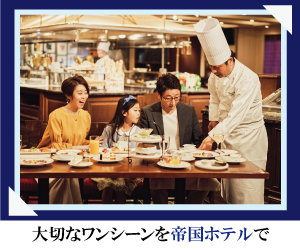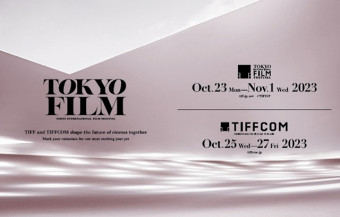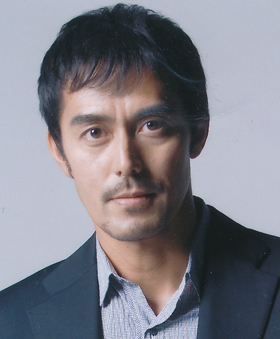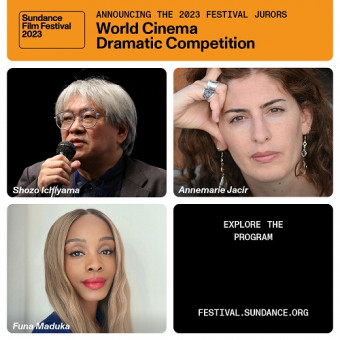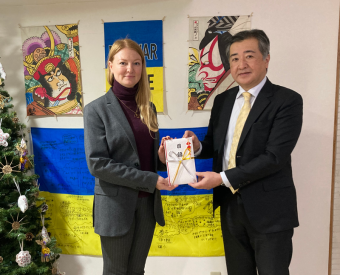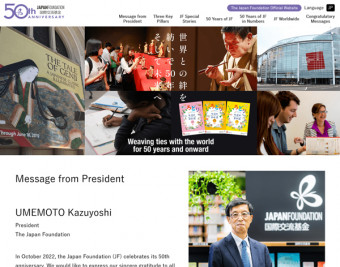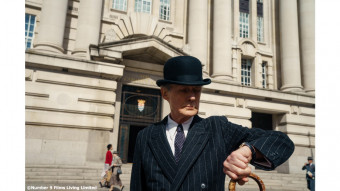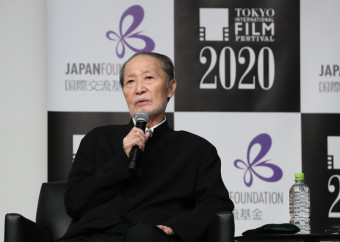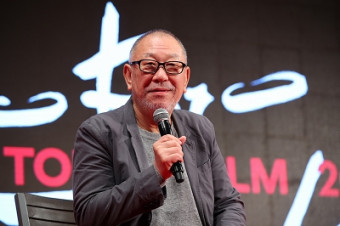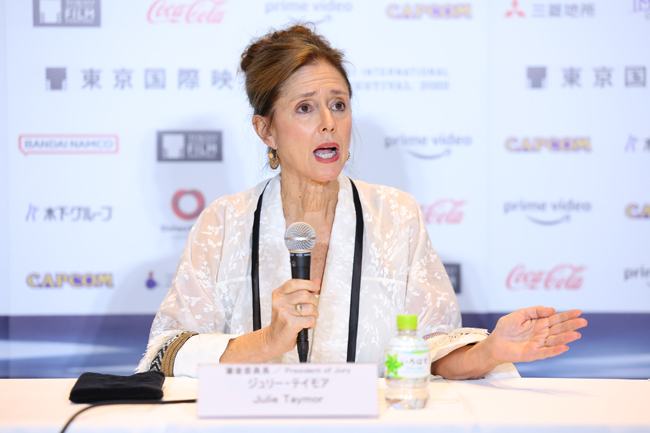
Members of the International Competition Jury were asked for comments first. Jury President Julie Taymor said, “I think we’re all very proud of the films that we chose, as well as the other award winners. They were an incredible array of stories from cultures that were so different. It was such an incredible experience to see these stories because they weren’t Hollywood stories. I want to extend our thanks to the programmers, because we got to share the distress of people from around the world. For us and for the viewers, it was amazing just for the diversity of the storytelling. We can’t let that die. We must listen to tales from around the world or we’ll never comprehend our differences.”
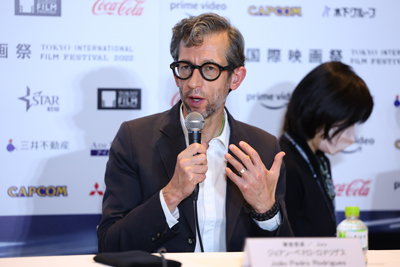
Juror João Pedro Rodrigues commented, “I just wanted to thank my fellow jurors for this experience. Despite our differences, we mostly agreed on the films, and it was actually quite easy work. I would like to thank the festival and the people who chose the films, as well as all the others. This Tokyo experience was wonderful.”
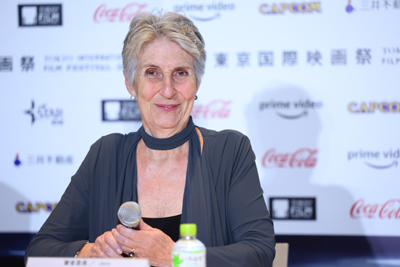
Juror Marie-Christine de Navacelle reiterated the others’ gratitude to the festival, and said, “We totally agreed on the films selected and we had nice discussions. It has been difficult for filmmakers to shoot during COVID, and theaters have also had problems, since people got used to seeing films at home. I think it’s going to be a fight to show films in theaters, and I think it’s important that we support and encourage people to go see films in the theater,”
Juror Shim Eun-kyung, speaking in her native Korean, also expressed gratitude to the organizers and to her fellow jury members. “I mentioned at our first press conference that I would like to feel the power of cinema through this experience, and while watching these 15 films, I constantly thought about this. Regardless of the time and genre, all the films are speaking about their hopes for love and peace. I would like to always remember this feeling as I pursue my career as an actor.”
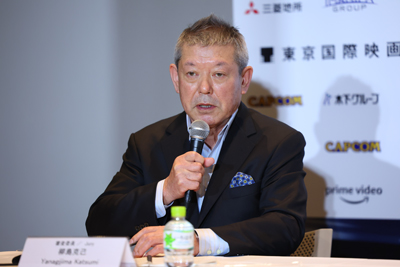
Juror Yanagijima Katsumi added, “We did see a diverse range of films, and there was a richness in expression from the filmmakers. As others have said, filmmaking has been very tough during the pandemic, and I think that showed in the films. I felt that we saw very few smiles, that we saw a lot of anger and frustration. But this reflected the time we live in and what people are feeling. Being a part of this panel, being able to watch films all day and discuss them was a really special experience for me, very different from being on a film set, and I’ll treasure it.”
The jurors were asked if there was another film that came close to the impact that The Beasts had on the panel. Said Taymor, “We liked everything in The Beasts, that’s why it won the Grand Prix. The music, the cinematography, the story, the script, the direction moved me, as it did the others. We immediately felt ‘That is cinema.’ As for another film, that would be World War III. It’s sad that we couldn’t have the director here, but it was wild and shocking and surprised us. Can you imagine making a Holocaust drama in Iran? It’s a very unusual film. I hope both these films get distribution in Japan. We have a tendency to be comfortable with seeing things that are familiar. I think that’s a problem. We need to go outside ourselves, have empathy, and through cinema we can experience the lives of others. That enriches us as human beings.”
Shim was also asked about her brief message from the stage about the Halloween tragedy in Itaewon, and what she had been feeling. Responded the actor, “This tragedy occurred during the festival, and it’s been on the news nonstop. I’ve had trouble sleeping. So many people, a lot of them in my generation, lost their lives. My heart has been very heavy, and I wanted to send my condolences from the stage. I feel the power of cinema, and through this artform, we’re expressing hopes for love and peace.”
The award winners then came in to share their feelings with the press.
Butterflies Live Only One Day director Mohammadreza Vatandoust, winner of the Asian Future Best Film Award, was asked about the film’s unusual structure, in which it only gradually becomes clear what’s going on. “If I used just one line, it would stop right there,” he explained. “I thought we needed some suspense to create cinematic charm. That’s why I decided to mete out the information gradually.
“Since I was 9 years old, I’ve been on the stage and in films, and I’ve won 82 awards. I tell my students in film school that winning a prize is like a gift, and you become happy, but the next day, your life goes on. It’s very meaningful that I’ve received this award from Japan, a country of fantasy for us. When it comes to literature, poetry and paintings, I think Iran and Japan are very similar. My friends often tell me that I should make more commercial films, but after this award, I feel that my way is right.”
Actor Mahsa Hejazi, star of Special Jury Prizewinner World War III, was asked for her reactions to Julie Taymor’s enraptured comments about the film. She responded, “I would like to first thank this wonderful film festival. In my opinion, I feel this is a very international film — no matter what country or culture or system, I think everyone can relate to the film’s themes.”
Asked about the woman to whom he had referred in his acceptance speech, as well as whether restrictions in Iran helped raise the level of artistic creativity, Mohammadreza Vatandoust said, “You have to look at Iran’s history. The position of women was very strong, we thought women were great historically. When it comes to modern times, men still think that all power comes from the mother and the wife. But certain change in roles have caused their position to weaken. Censorship doesn’t allow us to freely depict women in the way that we want, so we have to be more creative, to come up with different expressions in order to depict them.”
1976 director Manuela Martelli, whose lead, Aline Kuppenheim, had received the Best Actress Award, attended the conference to respond to reporters’ questions. One journalist asked how Martelli had been able to make the film, although 50 years had passed, and whether it had been personal. “I think it took 50 years because we still live in a very patriarchal world,” said the director. “We’ve had some portraits of the dictatorship, but not from the point of view of a woman. This shows that we’re still in a very unequal world. There’s still so much work to do on this.
“When I was writing the film, something very unexpected happened. In 2019, there was an outburst in Chile, a revolution started by the younger generation, who didn’t have the fear that past generations had. For me, it was so striking to see these kids fighting for their and their parents’ rights. I could finally understand how the people who fought for equality in the 70s were the same. So it’s almost like an homage to the new generation.”
Asked to comment about Aline Kuppenheim, she said, “I liked her as an actress since I was a little girl. Then I became an actress and we acted together. I knew her for many years. When I understood where the film was going, I felt that this bourgeois woman had to have a special sensibility for the outside world. I think Aline has this capacity because she’s a very smart actress. I wrote the script for her because I knew she would do an amazing job.”
Audience Award-winning director Imaizumi Rikiya (by the window) was asked what his star, Inagaki Goro, had thought about the award. He admitted that he’d not yet told him, since Inagaki was currently suffering from COVID. “It’s sad that he won’t be able to appear on stage with us when the film opens shortly in Japan, but it’s not such a bad thing to have a rest. Health is important, so I hope he has a good rest and that we can work together again.”
As to winning the award, the director said, “I am grateful to everyone who made the film with me, but I suffered a lot while making it. I don’t like being on location, I’m in pain whenever I make a film. But when I know that the film reached the audience and responded to it, that makes it almost worthwhile. I know it’s a Japanese film and I had an edge since we’re in Japan, but I’m still very happy about it.”
Finally, Peacock Lament director Sanjeewa Pushpakumara, winner of the Award for Best Artistic Contribution, was asked how he felt about the award. “I’m so glad about winning this award from one of the most prestigious festivals in the world, it’s a great honor. No Sri Lankan film has ever won such a prestigious award. I was so happy to work with such a wonderful cast and crew, so I’m just elated.”















